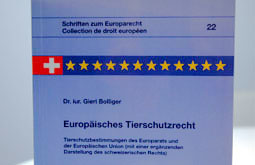Million fold deception
It is a decades old and nevertheless persistently repeated argument of the fur industry that the production of fur and accessories complies with animal protection regulations and laws. Manufacturers also claim that modern animal protection laws are in place in the production countries and that the industry adheres to them, especially with regard to animal holding and killing. On its website, the EFBA (European Fur Breeders Association) even claims that the health and wellbeing of farm animals is monitored by national and European veterinary bodies. Celebrities and party people believe these claims without questioning them and like to emphasize that their fur originates exclusively from farms practicing „good“ keeping.
Swiss consumers are more likely to be interested in whether products made out of the fur of the Mink, Silver Fox, Arctic Fox, Raccoon Dog, Chinchilla, or Nutria at least comply with the stipulations of the Swiss Animal Protection Act. These stipulations are fairly strict with regard to the keeping of wild animals and allow for a partial satisfaction of their most important needs as well as forbidding cruelty towards animals.
Animal cruelty with the blessing of the production countries
A comparison of the animal protection legislation in the most important production countries showed that fur animals may also be penned up in mesh wire cages in EU countries or that Minks held on farms in the U.S. are not protected at all. What all production countries have in common is that fur production takes places under circumstances not meeting the minimum requirements towards animal protection in any manner and that this would be considered to be cruelty towards animals according to the Swiss Animal Protection Act. Only the recommendations of the EU Commission on the Holding of Animals for Farming Purposes are decisive for the keeping of fur animals. Using conformity with the law as an argument for the acceptability of foreign fur products is no more than a label of cruelty and primarily also a consumer deception.

